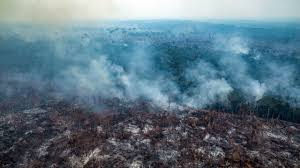Environmental Havoc In Brazil As In Last Two Years, Environmental And Climate Agenda Have Suffered Unimaginable Setbacks

The budget proposed by the government for the Ministry of the Environment (MMA) and related agencies for 2021 is the lowest since, at least, the end of the last century. This year’s Annual Budget Bill Proposal (Ploa), which is due to pass in Congress in February, earmarks R$ 1.72 billion (313 million US dollars) to cover all MMA expenses, including mandatory ones, like pensions and wages. In the historical series, since the year 2000, the amount earmarked for that purpose has never been lower than R$ 2,9 billion (529 million US dollars), adjusted for inflation. The data comes from an analysis carried out by Observatório do Clima.
The “Pushing the Whole Lot Through” report, released recently explores the second year of environmental havoc perpetrated by the Jair Bolsonaro administration, with data corresponding to the year 2020.
The report shows that, in the last two years, the environmental and climate agenda in Brazil has suffered unimaginable setbacks, on a frightening scale. Bolsonaro adopted the destruction of the environment as a policy and sabotaged the instruments for protecting our biomes; he is directly responsible for the increase in fires, deforestation and national emissions. The situation is dramatic, because the federal government, which is the one entity that could work out solutions for this scenario, is now the main generator of problems.
Some highlights of the report are:
a) A historical analysis of the entire available budget (mandatory and discretionary) for the environmental area (MMA and related entities) reveals that the expense forecast for 2021 (R$ 1.72 billion) is the lowest in two decades.
b) An analysis of the Ploa submitted to Congress by the government shows a 27.4% drop in the federal budget for environmental inspection and fighting forest fires when compared to the amount that had been earmarked in 2020. The drop is even greater in relation to 2019: 34.5%.
c) The proposed budget for 2021 reaffirms the current administration’s strategy to continue to stifle Ibama’s inspection authority and, in practice, to put an end to the activities of ICMBio: there was a 61.5% cut in the funds specifically earmarked for the creation and management of protected areas when compared to the 2018 budget.
d) The total number of fines imposed by Ibama in 2020 was also the lowest in two decades: there was a drop of 20% compared to the previous year and of 35% compared to 2018 (during the Temer administration).
e) The latest increase in deforestation – 9.5% in 2020, after a 34% increase in 2019 – coincides with a 42% drop in fines imposed for violations against the flora in the nine states of the Legal Amazon.
f) The anti-indigenous discourse reverberated in the field, especially in the Amazon: invasions of indigenous lands grew 135% in 2019. 256 cases were registered, according to the Indigenous Missionary Council.
g) At least 18 people were killed in field conflicts in 2020, according to a survey by the Land Pastoral Commission.
Despite two consecutive years of increased deforestation and fires, the government starts 2021 with a proposed 27.4% reduction in the budget for environmental inspection and fighting forest fires, considering both Ibama and Instituto Chico Mendes (Brazil’s national parks service). In 2020, the current administration deepened the dismantling of the social and environmental protection structures that were part of the Brazilian State, eliminating regulations and relinquishing environmental management duties.
The cut in funds comes as an addition to other actions, such as reducing controls on timber exports, allocation of positions in environmental agencies to military police officers and the proposal for the dismantling of the Chico Mendes Institute. Besides, there has been a public-relations effort — with poor results — to hand the Amazon to the military, in addition to health, political articulation and several other areas of state management. The efforts to “push the whole lot through” however, has encountered resistance from institutions, civil society and the international community.
In the Bolsonaro government is Ministry of the Environment/Direct Administration has taken on a lesser role as a producer of public policies, currently generating derisory value that does not even justify its own existence. This is a destruction project that is coming to fruition.
Views expressed here are those of Dr. Seema Javed, a known Environmentalist, Journalist and Communication Expert




